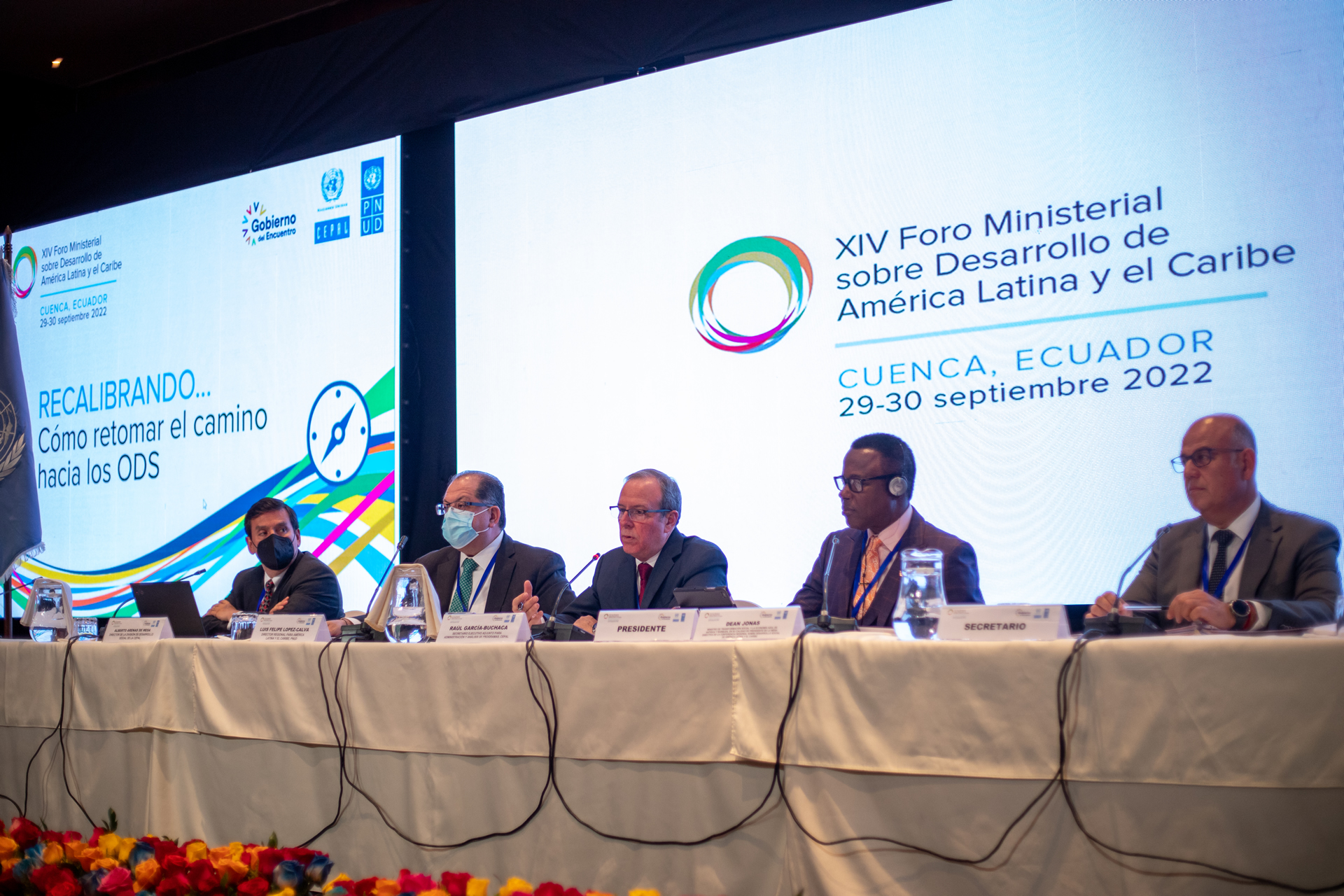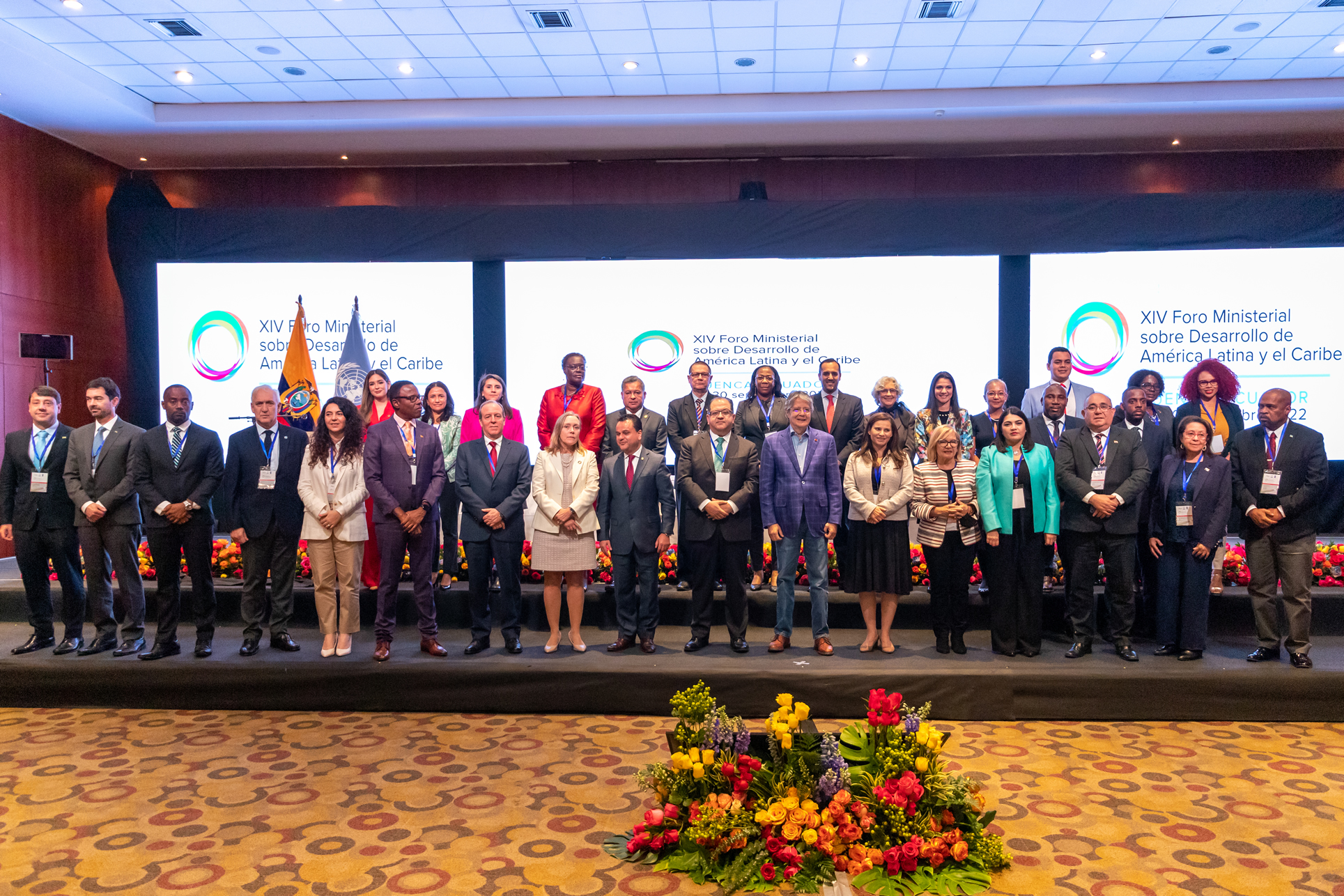Social Development Authorities Championed the Role of Regional Cooperation for Moving Forward on Strengthening Social Institutions
Work area(s)
The Fifth Meeting of the Presiding Officers of the Regional Conference on Social Development in Latin America and the Caribbean took place on Thursday, September 29 in the framework of the XIV Ministerial Forum for Development in Latin America and the Caribbean, organized with UNDP.

Authorities from Social Development Ministries and equivalent entities in Latin America and the Caribbean championed the role of regional cooperation for moving forward on strengthening the social institutional framework amid the current, complex socioeconomic scenario, during the Fifth Meeting of the Presiding Officers of the Regional Conference on Social Development in Latin America and the Caribbean of ECLAC, held on the afternoon of Thursday, September 29, 2022 in Cuenca, Ecuador.
The meeting took place in the framework of the XIV Ministerial Forum for Development in Latin America and the Caribbean, which was organized with the United Nations Development Program (UNDP) and concludes this Friday, September 30.
The Fifth Meeting of the Presiding Officers of the Regional Conference on Social Development was inaugurated by Raúl García-Buchaca, Deputy Executive Secretary for Management and Programme Analysis of the Economic Commission for Latin America and the Caribbean (ECLAC); Luis Felipe López-Calva, UNDP’s Regional Director for Latin America and the Caribbean; and Dean Jonas, Minister of Social Transformation, Human Resource Development and The Blue Economy of Antigua and Barbuda, in his capacity as Chair of the Presiding Officers.
“We are meeting in Cuenca to share views, experiences, opportunities and challenges regarding the social institutional framework and regional cooperation, with the aim of strengthening the development of universal, comprehensive, sustainable and resilient social protection systems in Latin America and the Caribbean,” Raúl García-Buchaca said during the gathering’s opening session.
The senior official explained that one of the four axes of the Regional Agenda for Inclusive Social Development (RAISD) – approved in 2019 during the Third Regional Conference on Social Development in Latin America and the Caribbean, held in Mexico – advocates precisely for strengthening the social institutional framework, which is the basis for implementing universal social protection systems and policies for social and labor inclusion.
“The strengthening of the social institutional framework is a precondition for fulfilling the State’s social commitments, generating quality programs and providing policies with continuity, legitimacy and coherence,” ECLAC’s representative stated, adding that “we are convinced that concerted and simultaneous action by countries is indispensable for moving towards sustainable development. The 2030 Agenda has put multilateralism at the center.”
Finally, Raúl García-Buchaca expressed confidence that the discussions in Cuenca “will contribute to progress on implementation of the Regional Agenda for Inclusive Social Development and its priority axes, especially on achieving a consolidated social institutional framework hand in hand with vigorous regional cooperation.”
Meanwhile, Luis Felipe López-Calva, UNDP’s Regional Director, emphasized that “this is the time to act and redouble our efforts to regain the progress lost and to return to the path of sustainable and inclusive human development.” He added that “the institutional framework plays a central role in the efficacy of any social policy. We know that it is not an easy task for countries to build this institutional framework, but the idea is also to say that no country is alone. There is a multilateral effort and an effort among the countries themselves to share experiences in this area.”
Dean Jonas, Minister of Social Transformation, Human Resource Development and The Blue Economy of Antigua and Barbuda, sustained that in Latin America and the Caribbean, “we have to collaborate, support each other to mitigate against all facets of devastation and crisis that continue to plague on all countries, especially with increasing demands for the limited availability and accessibility of sustainable financing.”
Following the opening session, a discussion panel took place on the new challenges for social institutions and regional cooperation, with the following participants: Alberto Arenas de Mesa, Director of the Social Development Division of ECLAC; Kirk Humphrey, Minister of People Empowerment and Elder Affairs of Barbados; Yorleny León Marchena, Minister of Human Development and Social Inclusion of Costa Rica; Andrea Brugman, Undersecretary at the Ministry of Social Development of Uruguay; Paula Poblete, Social Evaluation Undersecretary at the Ministry of Social Development and Family of Chile; Cayo Cáceres, Deputy Minister of Social Policy at the Ministry of Social Development of Paraguay; and Nancy Ampudia, Director of International, Bi-Multilateral and South-South Cooperation at the Ministry of Foreign Affairs and Human Mobility of Ecuador.
Also attending in person were government representatives from Grenada, Guatemala, Honduras, Panama, Saint Vincent and the Grenadines, and Trinidad and Tobago. Participating virtually were officials from Argentina, Brazil, Cuba, the Dominican Republic, El Salvador, Mexico and Peru, among other countries from the region.
The meeting aimed to facilitate the exchange of experiences and the identification of areas for cooperation and synergy between the Social Development Ministries and equivalent entities for getting back on track towards sustainable development, based on a solid social institutional framework in the region’s countries.
The gathering in Ecuador was expected to help deepen joint work ahead of the Fifth Regional Conference on Social Development in Latin America and the Caribbean, scheduled to be held in the second half of 2023.
Four sessions of the Regional Conference have taken place to date. The first was held in Lima in November 2015, the second in Montevideo in October 2017, the third in Mexico City in October 2019, and the Fourth was held virtually, with Antigua and Barbuda serving as Chair, in October 2021.
Related content

Authorities Will Dialogue in Ecuador about New Challenges for Social Institutions and Regional Cooperation
This Thursday, September 29, the Fifth Meeting of the Presiding Officers of the Regional Conference on Social Development in Latin America and the Caribbean will take place, in the framework of the…

Leaders from Latin America and the Caribbean discuss how to recalibrate the path towards the Sustainable Development Goals in the region
In the context of the XIV Ministerial Forum on Development of Latin America and the Caribbean, the Fifth Meeting of the Presiding Officers of the Regional Conference on Social Development in Latin…
Related link(s)
Country(ies)
-
Ecuador
- Latin America and the Caribbean
Contact
Public Information Unit
- prensa@cepal.org
- (56 2) 2210 2040

